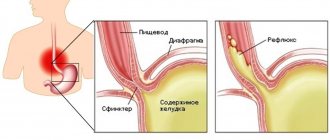Bad breath, which can become a constant companion of a person, can ruin relationships with others and reduce self-esteem. This condition is called halitosis, or halitosis. It is not an independent disease, but is one of the important symptoms of pathologies of the oral cavity and internal organs. You can drown out the stench with mints, spray or chewing gum, but this will not get rid of the problem. We need comprehensive diagnostic measures and subsequent elimination of the causes of halitosis.
Why does there be an unpleasant odor?
The oral cavity is the beginning of the digestive tract. It contains many bacteria; saliva contains enzymes that can break down carbohydrates. Therefore, after waking up, all people have bad breath. But this condition is not considered a pathology; it is enough to brush your teeth for the smell to disappear.
A persistent unpleasant aroma appears after eating dishes with garlic, onions, and some spices. When alcohol is abused, the sour stench persists for a day or more, which is associated with the metabolism of ethyl alcohol in the liver and the release of its vapors through the lungs.
A large number of unpleasant aromas accompany diseases that affect metabolism. In patients with diabetes who do not follow a diet or use insulin incorrectly, when ketone bodies accumulate in the blood, the smell of acetone appears on their breath. People suffering from kidney failure will repel those around them with the unpleasant aroma of urea, which the kidneys cannot remove from the body.
Common causes in adults are pathologies of the digestive tract. Halitosis is caused by:
- gastritis with high acidity;
- stomach ulcer, duodenal ulcer;
- cardiac sphincter insufficiency;
- esophageal diverticula;
- malignant tumors of the stomach or esophagus.
Respiratory diseases can also cause an unpleasant odor. Air from the lungs passes through the oropharynx, so it can partially leave the body through the mouth. It smells unpleasant with purulent diseases of the sinuses, chronic runny nose or tonsillitis.
When a toothbrush doesn't help: what can bad breath tell you?
Halitosis, stomatodizodia, ozostomia, fetor oris - these difficult-to-pronounce terms refer to the same phenomenon, which sometimes turns into a serious problem and causes a lot of inconvenience. We are talking about bad breath.
Where do the problems “grow” from?
The most common cause of halitosis in humans is, according to scientists, microorganisms that inhabit the oral cavity. During their life, volatile sulfur-containing compounds are formed - the same gases that do not smell the best. Normally, saliva has a detrimental effect on these microorganisms. But if the properties and composition of saliva are disrupted and its quantity decreases, bacteria begin to actively multiply.
What contributes to changes in the composition, consistency and quantity of saliva?
According to statistics, in 80% (and in children almost 100%) of cases, the cause of bad breath is associated with problems in the oral cavity itself. These are damaged teeth affected by caries, plaque on the tongue, insufficient hygiene, inflammation of the gums, periodontal disease, and salivary glands. Researchers associate 10% of cases of halitosis with diseases of the ENT organs: inflammatory processes in the nasopharynx, maxillary sinuses, tonsils, and larynx. This is due both to an increase in pathogenic microflora and its metabolic products, and to dry mouth due to impaired nasal breathing.
“Typical signs include nasal congestion and nasal discharge. There may also be a feeling of heaviness, fullness or pain in the area of the projection of the nasal sinuses, a decrease or complete absence of the sense of smell, and headaches.” Quote from the material “How to treat sinusitis at home?”
And only in 5-10% of people suffering from halitosis, oral odor occurs due to pathological processes in the internal organs.
Is there a difference between the smell and the smell?
The smell of our breath can tell us a lot of interesting things about our body. It is not only easy to identify, but it will not be difficult to eliminate if you figure out what it is connected to.
The smell of “rotten eggs” or, otherwise, hydrogen sulfide, may indicate diseases of the teeth, gums, salivary glands, as well as inflammation in the nose, pharynx and larynx. In addition, it can be detected from people suffering from apnea (temporary cessation of breathing during sleep), and it is associated with drying out of the oral mucosa.
A putrid odor can occur with a pathology such as esophageal diverticulum. This disease is characterized by a sac-like protrusion of the organ wall. In this protrusion, like in a reservoir, food debris accumulates, which subsequently decompose, which explains the smell of rot.
Sour breath smell is a sign of chronic gastritis with high acidity or gastroesophageal reflux disease (GERD). In this case, a symptom accompanying bad breath will be heartburn, which occurs due to reflux (reflux of gastric juice into the esophagus).
You can read more about heartburn in our article
The smell of acetone can be detected from the mouth of patients with diabetes mellitus, which is associated with the accumulation in the body and elimination of ketone bodies formed due to metabolic disorders.
If your interlocutor's breath smells of ammonia, he is likely to have kidney problems. An ammonia smell also indicates a possible infection with the bacterium Helicobacter pylori and a high risk of liver failure.
“Helicobacter pylori is considered the main cause of peptic ulcers.” Quote from the material “Living in acid: what do we know about Helicobacter pylori”
We should not exclude the fact that the air exhaled from the mouth retains the smell of foods with a strong aroma - onions, garlic, cheese, grapes, etc.
How to get rid of bad breath?
Before taking measures to eliminate bad breath, it is necessary to conduct a diagnosis. To detect odor, specialists use a special device - a halitometer. The exhaled air is assessed on a scale from 0 to 5.
You can assess the freshness of your breath yourself in several ways:
Touch your tongue to your wrist and smell.
After a deep breath, exhale into a medical mask placed on your face or a container pressed tightly to your mouth, and smell.
Scrape the coating off your tongue with a spoon and smell.
If at the same time you smell an unpleasant odor, and those around you confirm this, you should take action.
The success of eliminating this problem largely depends on identifying the root cause and getting rid of it.
If regular oral hygiene doesn't provide you with fresh breath, visit your dentist. Timely treatment of diseases of the teeth and gums will relieve you of bad breath, provided there are no problems with the internal organs.
The lack of results from the steps taken should be a signal to seek advice from a general practitioner. It is he who will be able to suggest the internal cause of your problem and refer you to a specialist.
You can make an appointment with specialists here
ATTENTION: the service is not available in all cities
How to prevent the occurrence of halitosis?
First of all, monitor the condition of your teeth and oral cavity, not forgetting to visit the dentist twice a year for preventive purposes. Daily hygiene procedures, the use of special products (rinses, floss to clean the interdental space), drinking enough liquid to prevent xerostomia (dry mouth), timely detection and treatment of diseases of the internal organs, throat, and nose will help you maintain fresh breath.
Sevil Ibraimov
The editors recommend:
The throat is asking for help. How to treat chronic tonsillitis?
Where can I find the courage to make up my mind? Gastroscopy – without fear!
How to protect your stomach from ulcers?
Dental causes of halitosis
When bad breath appears, disease of the teeth or gums is first suspected. Bacteria use leftover food in the mouth to feed themselves. If you brush your teeth incorrectly or completely abandon this procedure, a large amount of plaque accumulates in your mouth. Its rotting causes a repulsive odor. If plaque is not removed for a long time, dense tartar forms, and the stench persists for a long time.
Caries and tooth decay can also cause an unpleasant odor. These are areas where large numbers of microbes accumulate. The breath of people who do not remove decayed tooth roots in a timely manner has a strong smell. A stench can occur when wearing braces, dental plates, dentures, under which food debris accumulates. Any foreign body in the mouth requires additional cleansing.
The condition of the oral cavity is affected by the production of saliva. In some diseases it is not liquid enough. Dryness of the oral mucosa occurs, self-cleaning processes are disrupted and bacterial growth is activated. A similar mechanism works in hot weather or when playing sports, if you actively breathe through your mouth.
Smoking also contributes to the appearance of halitosis. Components of tobacco smoke settle on the teeth and combine with soft plaque. Dry mouth contributes to changes in the composition of saliva and an increase in its viscosity. You can get rid of the smell only by defeating a bad habit.
Treatment
Help before diagnosis
Many patients feel relief after rinsing their mouth with water and a small amount of lemon juice or a weak solution of soda. It is important to maintain oral hygiene: brush your teeth thoroughly 2 times a day, rinse your mouth with water after each meal, and use dental floss if necessary. In order not to suffer from bitterness in the morning, you should refrain from fatty foods and smoked foods at dinner.
Pregnant women are advised to eat often, in small portions, so as not to overload the gastrointestinal tract. After eating, you should not take a horizontal position or engage in physical labor. If an unpleasant taste in the mouth is accompanied by dyspeptic disorders, pain or a progressive deterioration of the general condition, it is important to consult a doctor in time to determine why the taste occurs in the mouth.
Conservative therapy
A specific taste occurs in many diseases, so only the main directions of therapy can be identified, and the selection of an individual set of therapeutic measures is carried out by a specialist. When caries is detected, treatment by a dentist is indicated: usually, after the elimination of chronic foci of infection, the unpleasant taste disappears. Most often used in therapeutic regimens:
- Antiseptics
. Regular rinsing of the oral cavity with a solution of chlorhexidine and its analogues ensures moisturizing and cleansing of the mucous membrane, and prevents the proliferation of pathogenic microorganisms. For stomatitis with pain, solutions of local anesthetics are used. - Antacids
. If the symptom is due to hyperacid conditions, modern non-absorbable drugs that quickly reduce acidity are recommended. A course of treatment with antisecretory agents is often required to achieve a lasting effect and healing of mucosal defects. - Choleretic drugs
. In case of biliary pathology, the composition of bile is improved and its release into the duodenum is stimulated, due to which the bitterness disappears. The drugs can be combined with hepatoprotectors to protect the liver from the effects of bile acids. - Antidotes
. Heavy metal poisoning is an indication for the prescription of specific complexones that bind and remove toxic substances from the blood. To speed up detoxification, large volumes of crystalloid solutions are administered intravenously.
What do different types of smell mean?
Unpleasant odors are caused by several types of volatile compounds produced by anaerobic bacteria. They use food debris on the tongue, between teeth and in carious cavities as a nutrient medium. Depending on the predominant compound, the character of the odor changes. Some of them suggest the pathology that caused halitosis:
- sour aroma – stomach diseases, gastritis or ulcers;
- feces, rotten cabbage - oral pathology, caries;
- smell of urine - kidney failure;
- the smell of ammonia or rotting apples – diabetes;
- rot, rotten meat - esophageal diverticulum.
You can find additional symptoms that will accurately indicate the cause of halitosis. If you have stomach pathology, you will experience pain between snacks. Diabetes mellitus is accompanied by excessive urination, dry mouth and thirst. Caries may not appear for a long time, but in advanced forms toothache appears.
Given the variety of causes, diagnosis, prevention and treatment of halitosis can be performed by doctors of different specialties. You need to see a dentist to get rid of dental diseases, but in other cases you will need to consult an endocrinologist, therapist or nephrologist.
Set my teeth on edge
Frequent heartburn and sour belching often accompany pregnancy: the growing uterus puts pressure on the diaphragm, intra-abdominal pressure increases. Those who eat a lot at night also often experience a sour taste in their mouth in the morning. But if these reasons have nothing to do with it, then it is better to deal with this symptom specifically. A persistent sour taste can occur:
Article on the topic
Diagnosis by a drop of blood. Siberian scientists identify potential diseases
for diseases of the digestive tract - often this is a sign of hyperacid gastritis, which is accompanied by increased stomach acidity, or gastroesophageal reflux, as well as gastric ulcer. If, in addition to a specific taste, a person is bothered by pain in the upper abdomen, nausea after eating, heartburn, sour belching, frequent diarrhea or constipation, weakness, it is worth visiting a gastroenterologist. And in order not to guess, you need to do a gastroscopy;
in case of problems with teeth - with caries, gingivitis, periodontitis, in addition to a sour taste in the mouth, there may be toothache, swelling and bleeding of the gums. Hurry to the dentist!
Ways to combat unpleasant odor
It is not always possible to independently guess that your breath smells bad. A person does not perceive an unpleasant aroma, so he can judge its appearance by indirect signs. If you have any suspicions, you can use the edge of a spoon to collect plaque from your tongue and smell it. The condition of the saliva is judged by licking the wrist and waiting for it to dry.
You can get rid of an unpleasant odor using traditional methods. At home, a decoction of dill is used to rinse the mouth. At home you can prepare an infusion of medicinal herbs with anti-inflammatory and antibacterial effects:
- chamomile;
- Oak bark;
- sage;
- mint;
- calendula;
- St. John's wort.
At home, a decoction is prepared from a mixture of several herbs to increase effectiveness. The infusion must be highly concentrated to suppress the growth of bacteria and cleanse the oral cavity.
If halitosis is associated with eating foul-smelling ingredients, parsley or celery root will help get rid of it. They block foul odors, and chewing the fibrous structure cleanses the teeth. Observance of a drinking regime relieves halitosis. Clean water cleanses the oral cavity and keeps saliva in a liquid state.
The reason why these methods do not help are pathologies of digestion and metabolism. You can get rid of them at home only under the guidance of a doctor.
Why do girls find blowjobs unpleasant?
Everything is simple here - many girls believe that putting “IT” in their mouth is disgusting and humiliating. Some people experience a gag reflex during a blowjob. Girls think that blowjob is a form of sexual perversion, but no, this is far from true. A blowjob is a great way to give your loved one pleasure and show how much you want to satisfy him.
Some girls themselves do not understand why oral sex is unpleasant to them. Each has some personal reasons, but everyone says that there are complexes and a psychological barrier.
Treatment of digestive diseases
If the oral cavity is sanitized, but the smell remains, you need to contact a gastroenterologist. Before treating halitosis, an examination will be carried out to find the cause of the disorders. Gastritis and ulcers are associated with poor diet, but inflammation of the gastric mucosa is supported by Helicobacter bacteria. You need to get rid of them comprehensively.
To do this, the doctor will prescribe the following groups of medications:
- antacids – to reduce acidity;
- antibiotics – drugs to kill bacteria;
- healing agents - bismuth nitrate or De-nol to restore the mucous membrane.
In the treatment of cardiac sphincter insufficiency, when the opening between the esophagus and the stomach does not close, antacids are also used, supplemented with prokinetics that improve peristalsis. Treatment of digestive diseases is impossible without following a special diet.
Oh, how sad I am!
Constant bitterness in the mouth occurs in those who eat too much fatty and fried foods or abuse alcohol, as well as in those who take antibiotics and allergy medications for a long time. But, if a strong bitterness in the mouth constantly bothers you, you need to rush to a gastroenterologist and do an ultrasound of the abdominal organs (liver and gall bladder). Causes of a bitter taste in the mouth:
pathologies of the liver, gallbladder and biliary tract - bitter bile enters the esophagus and mouth;
chronic cholecystitis and cholelithiasis - this may also cause pain under the right rib, nausea and vomiting.
“Express” diagnosis: what tests are done at Health Centers
Read more
How to improve your oral health
Good hygiene helps get rid of bad breath. If the cause is dense tartar, you need to visit the dentist and remove it mechanically. The toothbrush is powerless in this case.
Any dental defects must be treated. Carious cavities are cleaned and filled, and rotting tooth roots are removed. If necessary, prostheses are installed.
To get rid of the smell, you need to change your toothbrush and choose the right toothpaste. The brush should have medium hardness in order to clean the teeth well and not injure the gums. For better oral hygiene, you can buy a special tongue brush. Toothpaste is chosen based on gum sensitivity and related problems. The dentist will help you choose the product.
To thoroughly clean the spaces between teeth, it is not recommended to use wooden toothpicks. A special thread or brush will do the job better. Some threads contain mint fibers that add a pleasant aroma to your breath. And silver ions will stop the proliferation of pathogenic bacteria.
Teeth should be brushed morning and evening. Before going to bed, after hygiene procedures, you do not need to eat. Leftover food at night will become a breeding ground for the proliferation of microorganisms that damage tooth enamel.
Other symptoms
It is worth noting! In addition to the immediate manifestation in the form of the smell of eggs from the mouth, the patient may experience the following list of symptoms:
- the appearance of nausea and heaviness in the stomach ;
- bloating ;
- the phenomenon of constipation or diarrhea ;
- bouts of vomiting ;
- pronounced pain in the stomach ;
- feeling of fullness in the stomach.
Depending on the accompanying symptoms, it is possible to identify the pathology developing in the body.
Eliminating other causes of unpleasant odor
It is more difficult to get rid of bad breath that is not related to dentistry. If the cause is metabolic disorders, treatment may take a long time. With diabetes, it is important to achieve stable blood glucose levels. Then the ammonia aroma will not bother you. To do this, patients with type 1 disease carefully select the dosage of insulin, and for type 2 diabetes mellitus, they are prescribed a balanced diet and medications to lower blood glucose.
For those with severe kidney problems, the only way to eliminate the smell of urea is to undergo hemodialysis. This is a method of artificial purification of blood plasma, which helps get rid of metabolic products.
Treatment of tonsillitis and respiratory pathologies is carried out with antibiotics. But with the chronic course of the pathology, this is a long process.
The most common cause of bad breath is improper oral care. By visiting the dentist at least once a year and choosing the right brush, paste and floss, you can avoid the onset of halitosis or treat it at an early stage.











